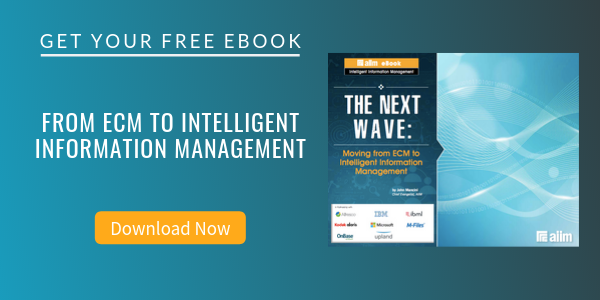
What Does the Next Generation of Information Leaders Look Like?
Intelligent Information Management (IIM)
As we’ve discussed before, we are in a world of rapid and accelerating change. Three major disruptive forces are accelerating the pace of change and driving organizations into information chaos:
-
CONSUMERIZATION is transforming what users expect from applications and how we deliver them. We are now in the era of user-centric IT.
-
CLOUD AND MOBILE are creating an expectation of anywhere, anytime access, and transforming how we engage with customers and employees.
-
THE INTERNET OF THINGS is creating massive amounts of new data and information, creating enormous new challenges and opportunities.
I hear the warning signs of information chaos every day in my conversations with AIIM members:
- Knowledge workers -- “I can’t find anything and the volume of ‘stuff’ I am trying to manage is rapidly spinning out of control.”
- Security officers -- “Information is leaking out of the organization at every turn via devices that weren’t even invented when we put our systems in place.”
- Records managers and lawyers – “The volume of information that is beyond our ability to control is increasing business risk and exposure.”
- IT people -- “Every time I turn around, ‘the business’ has implemented some new application that we didn’t even know about.”
- The C-Suite -- “I can’t believe we are not getting more value out of the money we spend on technology.”
Organizations everywhere are struggling to transition to Information systems at work that are simple, secure, and work anywhere, anyplace, and on any device. In striving to achieve this mission, they struggle with people, with processes, and with technology, and in doing so, usually do so with a focus that is about 5% people, 15% process, and 80% technology.
Unfortunately, they have it exactly backwards. The organizations that will thrive in the future need to do so with a strategy that is about 80% people, 15% process, and 5% technology. The “people” who are critical to the future – I call them Information Professionals – come in two flavors:
- those who architect the systems we use to manage information; and
- those who use these systems to create and innovate in their day-to-day jobs.
It is no longer enough to be a business strategist. It is no longer enough to be a technologist. It is no longer enough to be an innovator. Our organizations need information professionals who are all three, and they are in short supply.
How is your organization preparing to equip this next generation of leaders? How are you updating your skills to make sure you are one of them?
About John Mancini
John Mancini is the President of Content Results, LLC and the Past President of AIIM. He is a well-known author, speaker, and advisor on information management, digital transformation and intelligent automation. John is a frequent keynote speaker and author of more than 30 eBooks on a variety of topics. He can be found on Twitter, LinkedIn and Facebook as jmancini77. Recent keynote topics include: The Stairway to Digital Transformation Navigating Disruptive Waters — 4 Things You Need to Know to Build Your Digital Transformation Strategy Getting Ahead of the Digital Transformation Curve Viewing Information Management Through a New Lens Digital Disruption: 6 Strategies to Avoid Being “Blockbustered” Specialties: Keynote speaker and writer on AI, RPA, intelligent Information Management, Intelligent Automation and Digital Transformation. Consensus-building with Boards to create strategic focus, action, and accountability. Extensive public speaking and public relations work Conversant and experienced in major technology issues and trends. Expert on inbound and content marketing, particularly in an association environment and on the Hubspot platform. John is a Phi Beta Kappa graduate of the College of William and Mary, and holds an M.A. in Public Policy from the Woodrow Wilson School at Princeton University.



